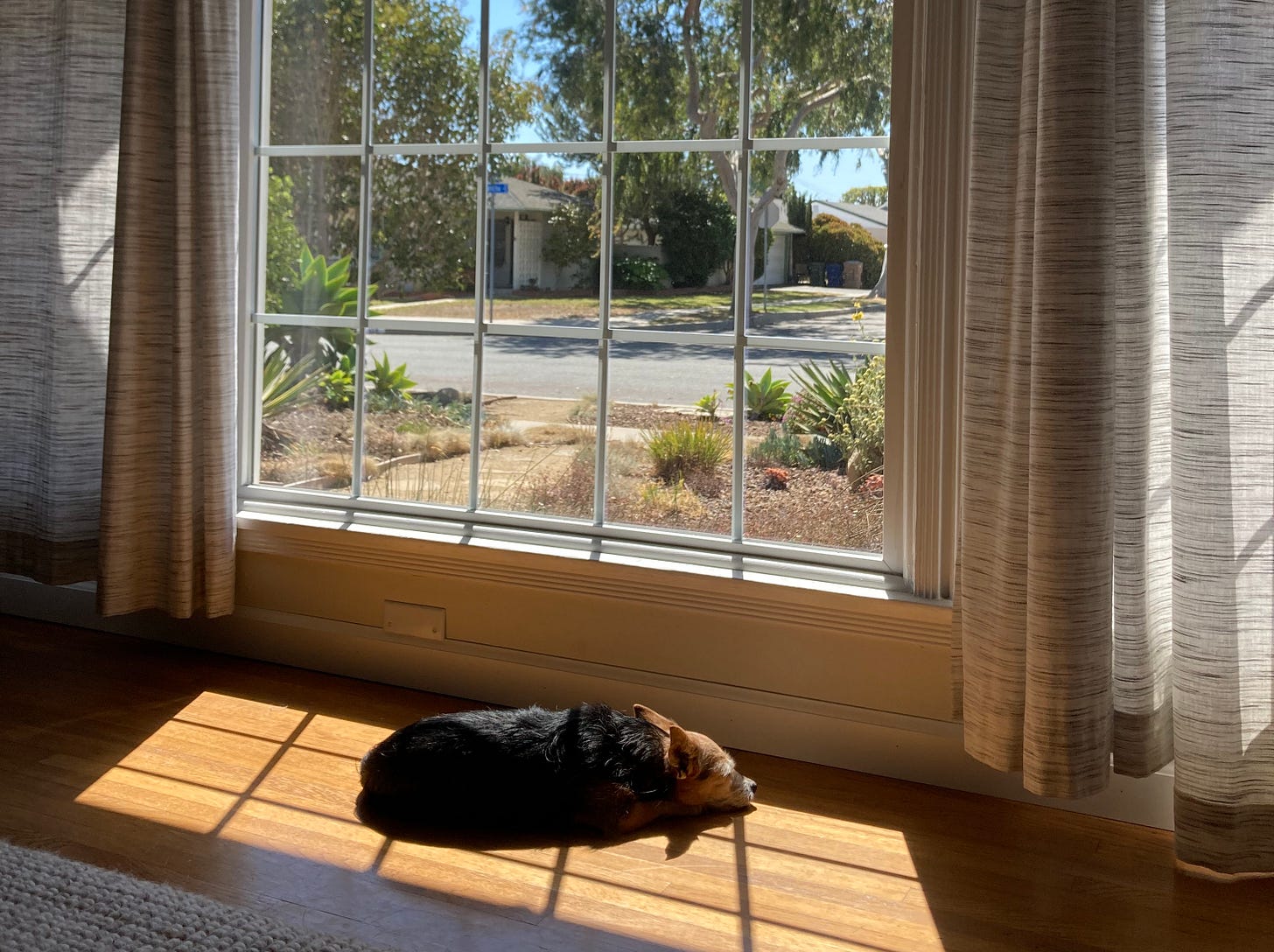Holy heartbreak
All dogs will be received in Graceland
Paul Simon’s “Graceland” starts out as a road trip song, all jangly slide guitar and upbeat percussion and landmark-spotting. Paul and his son are traversing the South, tracing the Mississippi, on their way to visit Elvis’s former home. You’re right there with them, bouncing along, with reason to believe that you, too, will be received in Graceland.
You know the rest. Soon enough, the pace changes just slightly, and she comes back to tell him she’s gone. (As if he didn’t know that, as if he didn’t know his own bed.) And it hits you. Oh my god, this is a breakup song.
That’s when Paul croons that perfect line, the one that has been echoing in my head lately: “Losing love is like a window in your heart, everybody sees you’re blown apart.”
In “Graceland,” tragedy and hope go hand-in-hand. There might even be some salvation in letting the world see you obliterated by grief.
There are so many varieties of heartbreak. The loss of a loved one too soon; or at the end of a long life well lived, but still, somehow, premature. The slow drifting apart of a friendship. The sting of betrayal. The grief of losing the unconditional, uncomplicated love of a pet. The dissolution of a relationship that could have been perfect if the timing was right. The erosion of an idea, a dream for your life or the world. The agony of witnessing suffering you can do nothing about. Each one blows you apart in its own particular, unpredictable, inescapable way. Each one opens a window to your heart.
Last week my beloved dog Greta died in my arms in the car on the way to the animal hospital, after being attacked by a bigger dog on the beach in Malibu. We were four days shy of seven years together — years of major change, various moves, countless adventures, multiple relationships, a handful of jobs, graduate school. Ours was the defining relationship of my twenties, and one of the only things I could picture clearly as I looked into my next decade. And then suddenly, our life together was over.
The grief that has followed has been indescribable. In those first days, I wasn’t sure how I would survive. I had lost love before, and survived, so I knew I would. I just couldn’t yet see how. Every time I closed my eyes, I saw her again in my lap, somehow tinier than ever, looking up at me with unimaginable devotion as I told her again and again that I loved her, that I was sorry, that it would be okay.
After I said goodbye to Greta, I made my way through the unusually green hills of Malibu, back toward the east side of town. As I switch-backed through the Santa Monica Mountains, I was overcome by a pressing question. It rose in my chest like a panic, the instinctive urgency of self-preservation. How do I make this feeling go away? And how do I protect myself from ever feeling this bad again?
My mind turned to the practice of nonattachment, a concept most commonly associated with Buddhism, but present in a number of other eastern religions, as well as Christianity. My layman’s understanding of it is this: suffering comes from our attachment to anything material or illusory, which according to some means anything at all. The goal of the practice isn’t apathy, but serenity. A complete and nonjudgmental acknowledgement of the reality of the present moment. Nonattachment doesn’t preclude grief or heartbreak, it just accepts the perpetual nature of change and impermanence.
I keep trying to imagine what it would be like to fully accept the reality of Greta’s death, to be at peace with this gutting loss. To think that her sudden, violent passing was simply nature running its course. My instinct is to say that, for me, the pursuit of nonattachment wouldn’t be a brave or noble or even spiritually-inclined endeavor. It would be coming more out of fear than anything, a futile attempt to bypass the intensity of my sadness, which on some level I am savoring, because it exists in proportion to the intensity of my love.
Zen Buddhist teacher David Loy wrote that nonattachment practice “helps us find a place of imperturbable equanimity and serenity that is impervious to tragedy. No matter what happens in the world, we are at peace. We accept it, not because that’s what we want to happen, but because that’s what did happen.”
But I actually don’t want to be impervious to tragedy. As awful as it is, I want to be as intimately acquainted with my grief as I am with my joy. I want to fully experience the breadth of aliveness, the absolute ecstasy and agony of being a person — loving, losing, all of it. I want to ride the roller coaster while I can. I want everybody to see me blown apart.
At this point it's pretty clear I’m not going to become a monk. I’m not as interested in serenity and equanimity as I am in being wildly, fiercely in love with being alive, experiencing it fully while I can. But maybe there is a variation on nonattachment that can suit an emotional thrill-seeker like me, one that welcomes the highs and the lows equally, knowing neither will last forever, and eventually they’ll balance each other out. After all, sadness is impermanent just like everything else. Just yesterday I caught myself singing along to a song on the radio, surprising myself with a glimpse of joy after a week of sorrow.
Anyone who has had their heart broken has probably wondered whether it might not be better to just avoid relationships altogether. In some ways, it would be easier to never grow attached in the first place, to avoid all this pain and grief. Steering away from closeness can feel like a sensible survival instinct.
And yet, most of us will turn to love again. We eventually adopt new dogs. We get swept up in romance. We build lives around people and places and things that are impermanent, unreliable, entirely out of our control. We love not just at the risk of loss, but at its certainty. What a foolish, brave bunch of sufferers we are.





so incredibly sorry for your loss ellie. a beautiful piece for a wonderful pooch.
Yes yes wow is you! So eloquently and poignantly, poetically and bluntly said. Thank you. 💕